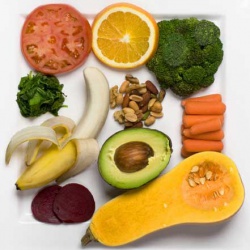Potassium
Contents
Description
Potassium is an essential mineral which constitutes about 5% of the total mineral content of the body. It works in conjunction with sodium, to help regulate water balance within the system, as they both regulate the distribution of fluids on both sides of the cell walls. Potassium chloride is the main variety of this mineral that works in association with sodium to perform a number of critical body tasks.
Potassium is imperative for normal body growth, for stimulation of nerve impulses necessary for muscle contractions, and to assist proper alkalinity of body fluids. It assists in helping the body convert glucose to glycogen, the form in which glucose can be stored in the liver. It also stimulates the kidneys to eliminate poisonous body waste.
Storage & Absorption
Potassium is rapidly absorbed in the small intestine, and excreted from the body mainly through urination and perspiration. The kidneys have the ability to maintain normal serum levels by filtration, secretion and excretion of Potassium. Excessive buildup of this mineral may result from kidney failure or from severe lack of fluids.
Excessive use of salt can deplete the body's conservation of Potassium. It can also be depleted in other ways such as, excessive sweating, diarrhea, or vomiting. Coffee, alcohol and sugar all have an antagonistic effect towards this mineral in the system.
Medical Benefits
Potassium has been used to treat high blood pressure caused by excessive sodium intake. It has been known to assist in cases of stroke, anxiety/stress, muscular strength, metabolism, heart and kidney disorders, electrolytic function and the general nervous system. Potassium chloride has also been effective in treating allergies.
Abnormal heartbeat, anemia, headaches, intestinal pain and diabetes have also been aided with the addition of this mineral, when there was a deficiency of Potassium in the body. Giving it to patients with mild diabetes can reduce blood pressure and blood sugar levels. Potassium has also been used in the treatment of diarrhea in both adults and infants.
Potassium may be beneficial for other ailments such as angina pectoris, hypertension, mononucleosis, fractures, colitis, alcoholism, insomnia, polio, fever, worms, congestive heart failure, myocardial infarction, arthritis, gout and muscular dystrophy.
Food Sources
The most number one food source for Potassium is bananas. Some other foods which contain this valuable mineral are vegetables, whole grains, oranges, sunflower seeds, salmon, poultry, nuts and mint leaves.
Dosage & Toxicity
A recommended dietary allowance for Potassium has not been established, but the amount found in the average daily diet has been estimated from 2000-6000mg per day just from eating related food-groups. There is no known toxicity of this mineral.
Related Discussions
- Potassium Normalizes High Blood Pressure
- Bananas Nutritional Benefits & Facts
- Potassium rich foods and Diabetes
- Potassium and Rheumatoid Arthritis
- Pumpkin - A Nutritional Powerhouse
